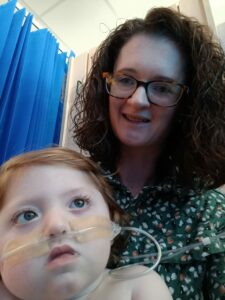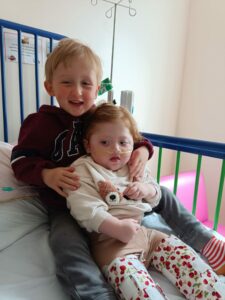Almost 200 children have received hospital care at home, thanks to Blackpool’s paediatric virtual ward
Tens of thousands of children will be able to receive hospital-level care at home thanks to an expansion of virtual wards, chief executive Amanda Pritchard will announce on the 75th anniversary of the NHS.
Almost 200 children have already been cared for at home with their families, thanks to Blackpool Teaching Hospitals’ paediatric virtual ward.
Since going live on 16 December 2022, a total of 191 children have been cared for by a team comprising of doctors and nurses, with the Paediatric Consultant team at Blackpool Teaching Hospitals providing oversight 24 hours a day, seven days a week.
The development of the paediatric virtual ward by the Trust, in collaboration with Fylde Coast Medical Services has meant that children and young people, who would otherwise require hospitalisation, have received acute care, monitoring, and treatment at home, for short durations, as an alternative to care in hospital. The average length of stay is just five days, with the majority of patients then able to stay at home following their virtual ward treatment.
Patients who are supported through an acute illness, are often able to recover better in their own homes, with their families, friends and home-comforts around them, and the roll out and expansion of virtual wards is supported by a growing and developing evidence-base that shows benefits for both the patients and the NHS.
What’s more virtual wards are helping to ease pressure on hospitals by reducing the length of stay or avoiding admission to hospital altogether.
Sarah and Carsten Ezard’s 21-month-old daughter Hope has a rare neurodevelopmental disorder, GNB5, as well as chronic lung disease and feeding issues.
Having been born prematurely at just 29-weeks, little Hope has been in-and-out of hospital for most of her life, to be treated for recurring respiratory infections, to receive high-pressure oxygen and antibiotics and often because she is just too unwell to be at home with her family.
These frequent stays in hospital affects family life immeasurably, especially as Hope has four siblings at home. But the introduction of the paediatric virtual ward at Blackpool Teaching Hospitals has meant that Hope can now be moved home sooner, and receive the care she needs while surrounded by her family and all the things she loves.
Mum Sarah said: “Hope has a high care demand, but being able to receive some of that care at home is so beneficial to Hope, and our other children.
“We know that in general, Hope doesn’t sleep very well when she’s in hospital and is more vulnerable to hospital infections, so there is peace of mind when she’s being cared for at home, on the virtual ward, she’s less likely to pick up anything that might make her more poorly, and she’s relaxed and comfortable in her own bed. And the fact that the brilliant community nurses are just a phone call away reduces any anxieties that we might have had.
“For us, it’s amazing that we can have her at home with us as much as we do, and I would encourage other parents and families to talk to their doctors and nurses, about paediatric virtual wards in their area.”


The NHS is increasingly introducing virtual wards to support people at the place they call home and can include remote monitoring technology or face-to-face care.
Blackpool’s paediatric virtual ward continues to develop, and will eventually include both pathways.
Remote care, which uses remote technology for monitoring, will enable observations such as oxygen saturations, blood pressure and temperature to be taken regularly, and uploaded via devices such as a mobile telephone or tablet. These observations will be monitored by clinicians within a central hub, and there will be contact with the patient’s family daily.
The virtual ward will also continue face-to-face care, led by the Blackpool Teaching Hospital’s children’s community nursing team, which supports the patient in their own home.
The children’s community nursing team have described how the project has benefited their team to work more effectively, and the Trust has developed the team with additional training and equipment to ensure the virtual ward project is one that if effective for all involved.
